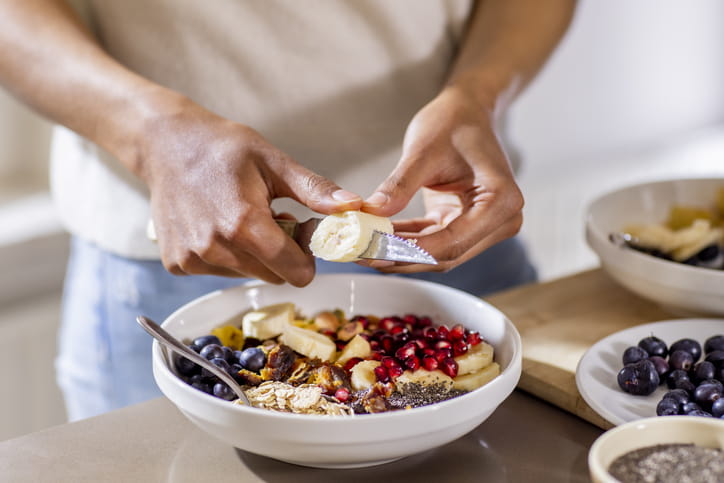Healthy eating after cancer

After going through cancer treatment, food can be a great comfort — or a source of anxiety. You may have heard you should avoid certain foods. Or maybe medications have affected your appetite. You may be too exhausted to think about what you should be eating, let alone prepare it.
"When going through cancer treatment, food is one of the few things you can control," says Carolyn Farhy, MS, RDN, LDN, medical nutrition therapist at Main Line Health. "But knowing how and what to eat can be confusing. Someone told you to stay away from soy or dairy. You've gained weight and don't know how to manage it. You've heard that sugar feeds cancer cells.
"You've been through so much already. We can help to lessen the anxiety around food and help you enjoy it again, while also getting the most benefit from it."
Challenges of eating healthy during cancer treatment
Your treatment plan is very individualized, and so is your response to cancer treatment. Some people can go through treatment without experiencing side effects, while others get hit hard.
Medications can change the way food tastes. You may also be experiencing nausea or have less of an appetite overall. These effects can linger even after you're no longer taking the medication.
"The good news is, we can make modifications to your foods to help them taste better," Farhy says. "I don't recommend eliminating any particular food or food group - just be mindful about what's going to give you the most protective benefit. You should be able to enjoy food and not be afraid to have a piece of cake or a treat, as long as you're balancing it in other ways."
Cancer and fatigue
Fatigue is one of the biggest challenges for nearly all cancer patients, regardless of diagnosis or treatment plan.
"Protein and hydration are very important, but people struggle with them during and after treatment. It may help to eat small amounts more often. Try for a combination of good carbohydrates and good protein with your meals or snacks."
Because some cancer drugs can alter the lining of your digestive tract and how you can handle protein, Farhy recommends lean, bland proteins like chicken, fish and eggs. Plant-based proteins that come from nuts or seeds, beans and legumes are also good.
"You might not be able to get as much of the protein that chicken provides in all your meals, but as long as you're including some source, it will help. That could be toast with peanut butter, or yogurt with berries, or scrambled or hard-boiled eggs. Just incorporating it is important."
Protein drinks or powders are another option, especially if you're on the go with work, family responsibilities or long days with multiple appointments.
"Hydration is also very important. This can come from fruits and vegetables as well as water. Try watermelon, broth, Jell-O™ and even popsicles if you're really struggling. Any food or drink can be hydrating, as long as it doesn't contain caffeine."
How to make food taste better for cancer patients
The sweet taste is still there for most people, so you may be able to increase the sweetness of foods or enhance their flavor while maintaining good nutrition content. Farhy suggests using natural sweeteners like fresh fruit or small amounts of 100% fruit juice, honey, maple syrup or agave, or even a little bit of dark chocolate, to enhance flavor. Try to limit added refined sugars, as they are empty calories and can increase inflammation.
"Sometimes I tell patients that if it's not working, don't force it," Farhy says. "You don't want to have a negative association with food. In time, when you get past treatment and things improve, you can circle back to it."
Myths about foods to avoid during cancer treatment
Cancer patients often hear they should eliminate soy from their diet. Evidence shows that up to two servings of whole soy like tofu, soy milk or edamame a day are deemed safe to consume.
Another common myth is that sugar feeds cancer. All cells in our body need glucose or carbohydrates for energy, but it's important that they be nutrient-dense carbohydrates and not refined sugars.
Nutrition counseling for cancer patients
Nutritional counseling can be a great help to patients as well as loved ones who may be shopping for or preparing meals for patients.
"We can help people with tips, meal suggestions, recipes, shopping lists and meal delivery services like Manna and Meals on Wheels," Farhy says. "As a registered dietitian, I'm very careful to provide people with evidence-based resources and information. The American Institute for Cancer Research has recipes as well as health and cancer-related nutrition facts. The Academy of Nutrition and Dietetics is another resource.
"The level of interest in healthy eating and nutrition has grown consistently, especially as many cancer patients now are younger. They tackle it from the very beginning, and see how it helps them maintain strength, get through treatment and support them afterward. I'm here for patients from diagnosis through survivorship, because their questions and needs will change over time.
"Everyone eats, right? Everyone has their preferences and traditions — foods that bring us joy and bring us together. Life is so much better when we can get back to that enjoyment."
Next steps:
Learn more about nutrition services at Main Line Health
Learn more about cancer care at Main Line Health
Why (and how) you should eat healthy during cancer treatment
Navigating your protein intake
 Content you want, delivered to your inbox
Content you want, delivered to your inbox
Want to get the latest health and wellness articles delivered right to your inbox?
Subscribe to the Well Ahead Newsletter.
